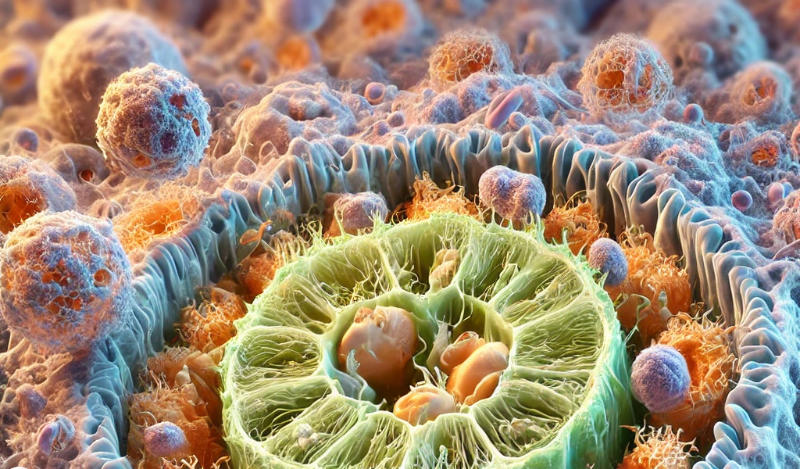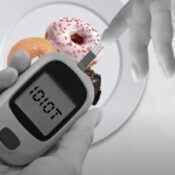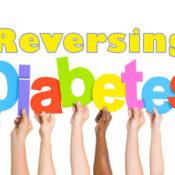Originally written on 2024-Aug-08. 24 citations at bottom.
What is autophagy?
Autophagy is a cellular process where cells break down and recycle their own components, including damaged proteins and organelles. This “self-eating” mechanism is crucial for cellular health, longevity, and adaptation to stress. Here’s a basic explanation of autophagy’s potential effects on eyes, fat cells, and fat conversion, based on peer-reviewed studies:
1. Cognitive Enhancement
Here’s a quick rundown of six studies that looked at how boosting ketones might help the brain:
Fortier et al. (2019) – In a six‐month trial with people having mild cognitive impairment (MCI), a ketogenic drink (rich in medium‐chain triglycerides) raised blood ketones and was linked with better performance on memory, language, and executive tests .alz-journals.onlinelibrary.wiley.com
A review from the Journal of Nuclear Medicine – This work summarized data in MCI/Alzheimer’s patients showing that—even as brain glucose use falls—ketone uptake remains steady, and elevating ketones (whether by diet or supplementation) can help “rescue” brain energy and may slow cognitive decline. jnm.snmjournals.org
A URMC study – Researchers in a preclinical setting found that administering D‑β‑hydroxybutyrate (a key ketone) rescued several hippocampal functions in animal models (like synaptic activity and plasticity), suggesting ketones can help keep brain networks “in sync.” urmc.rochester.edu
Murray et al. (2016): This study investigated the impact of a ketogenic medium-chain triglyceride (kMCT) drink on individuals with mild cognitive impairment (MCI). Over a six-month period, participants consuming the kMCT drink showed improved cognitive outcomes, which were partly attributed to increased blood ketone levels. The findings suggest that elevating ketones can enhance brain energy and support cognitive function in MCI patients. alz-journals.onlinelibrary.wiley.com
Evans et al. (2019): In this review, the authors explored the potential therapeutic applications of exogenous ketone supplements. They found that such supplements could lower blood glucose levels and improve certain aspects of cognitive function. The study highlights the promise of ketone supplementation in managing conditions like type 2 diabetes and neurological diseases, though it calls for further research to fully understand the benefits and mechanisms involved. physoc.onlinelibrary.wiley.com
Waldman et al. (2023): This study examined the effects of a low-dose ketone monoester supplement on cognitive performance in female athletes. Despite an increase in blood ketone levels, the supplementation did not lead to significant improvements in cognitive performance during mentally demanding tasks. The findings suggest that ketone supplements may not enhance cognitive function in all populations, particularly in the absence of cognitive impairment or significant fatigue. link.springer.com
In my opinion, these findings—spanning from animal work to human trials—suggest that enhancing ketone availability could be a promising way to support cognition, especially when glucose metabolism falters.
2. Eye Health
Autophagy plays a vital role in maintaining eye health and potentially healing eye-related issues. A study by Boya et al. (2016) in Nature Reviews Molecular Cell Biology showed that autophagy is essential for the proper functioning of retinal pigment epithelium cells, which are crucial for vision. Impaired autophagy has been linked to age-related macular degeneration and other eye disorders.
3. Fat Cell Reduction
Autophagy can contribute to the reduction of fat cells (adipocytes) in size and number. Zhang et al. (2009) in Cell Metabolism demonstrated that autophagy is required for basal and hormone-induced lipolysis, the breakdown of fat. Enhancing autophagy could potentially lead to increased fat breakdown and reduced fat storage.
4. White to Brown Fat Conversion
Autophagy may play a role in the conversion of white adipose tissue (WAT) to brown adipose tissue (BAT), a process known as “browning.” Altshuler-Keylin et al. (2016) in Cell Metabolism showed that autophagy is necessary for the efficient browning of white fat, which could increase energy expenditure and potentially aid in weight loss.
5. Metabolic Regulation
A study by Singh et al. (2009) in Nature showed that autophagy regulates lipid metabolism by eliminating lipid droplets in liver cells. This process, called lipophagy, suggests that enhancing autophagy could potentially reduce fat accumulation in various tissues.
6. Cellular Stress Response
Autophagy is crucial in the cellular stress response, which can indirectly affect fat metabolism. Kaushik et al. (2011) in Nature Medicine demonstrated that autophagy in hypothalamic neurons regulates food intake and energy balance, suggesting a link between autophagy and systemic metabolism.
7. Aging and Longevity
Autophagy’s role in cellular maintenance extends to longevity and aging-related processes. Rubinsztein et al. (2011) in Nature Reviews Drug Discovery highlighted how enhancing autophagy could potentially slow aging processes in various tissues, including those related to metabolism and fat storage.
In summary, autophagy is a complex cellular process with wide-ranging effects on health, including potential benefits for eye health, fat cell reduction, and metabolic regulation. While research shows promising connections between autophagy and these areas, more studies are needed to fully understand and harness its therapeutic potential.
For an account of how autophagy was a key factor in reducing my insulin resistance (putting type 2 diabetes into remission), as well as a menu of practices and foods that are key: https://clearsay.net/food-as-fountain-of-youth
So where can I buy me some autophagy?
Based on the research (citations 10-16 at bottom), there are several effective ways to induce autophagy:
1. Fasting
– Intermittent fasting for 18-48 hours appears to be one of the most potent triggers for autophagy.
– Even shorter fasts of 12-16 hours can have benefits.
2. Ketogenic diet
– A very low-carb, high-fat diet can induce a fasting-like state and promote autophagy.
3. Exercise
– Both aerobic exercise and resistance training can stimulate autophagy, with some studies suggesting high-intensity interval training (HIIT) may be particularly effective.
4. Calorie restriction
– Reducing overall calorie intake, even without full fasting, can trigger autophagy.
5. Sleep
– Getting adequate, quality sleep supports autophagy processes.
6. Stress reduction
– Managing chronic stress through techniques like meditation can create an environment conducive to autophagy.
7. Certain nutrients and compounds
– Some studies suggest that curcumin (from turmeric)*, resveratrol, and EGCG (from green tea) may promote autophagy.
* Regarding curcumin, evidence is mounting it can cause liver issues. Turmeric has an extremely high concentration of oxalate (1969 mg oxalate per 100 grams of turmeric).
– Citrus bergamot, particularly its limonene content, has shown promise in jumpstarting autophagy.
8. Hydration
– Proper hydration supports cellular processes including autophagy.
It’s important to note that the effectiveness of these methods can vary between individuals, and some approaches (like extended fasting) may not be suitable for everyone, especially lean people.
How insulin inhibits autophagy
Insulin and autophagy have a complex and interconnected relationship. Here are the key points about how insulin relates to autophagy.
1. Insulin inhibits autophagy
– Insulin is an anabolic hormone that promotes energy storage and inhibits catabolic processes like autophagy.
– Insulin activates the PI3K-AKT-mTORC1 signaling pathway, which inhibits autophagy by phosphorylating and inactivating ULK1, a key initiator of autophagy.
2. Molecular mechanisms
– The mTORC1-ULK1 nexus is a critical junction between insulin signaling and autophagy regulation.
– Insulin also inhibits autophagy by inactivating FOXO transcription factors, which regulate autophagy gene expression.
3. Reciprocal regulation
– While insulin inhibits autophagy, autophagy can in turn affect insulin signaling and sensitivity.
– Proper functioning of autophagy is generally favorable for insulin signaling, while disrupted autophagy can induce insulin resistance.
4. Role in metabolic disorders
– In conditions like obesity and type 2 diabetes, characterized by insulin resistance, there are often alterations in autophagy.
– Impaired autophagy is considered a hallmark of diabetes.
5. Tissue-specific effects
– In skeletal muscle, autophagy plays a role in regulating metabolism and can help improve insulin resistance.
– In pancreatic β-cells, autophagy is important for cell function and insulin secretion.
6. Therapeutic implications
– Modulating autophagy may have potential for treating metabolic disorders like insulin resistance and type 2 diabetes.
7. Nutrient availability
– Nutrient status affects both insulin and autophagy – nutrient abundance promotes insulin secretion and action while inhibiting autophagy, whereas nutrient deprivation induces autophagy.
In summary, insulin and autophagy have an antagonistic relationship, with insulin generally inhibiting autophagy. However, their interplay is crucial for maintaining metabolic homeostasis, and dysregulation of this balance can contribute to metabolic disorders.
Disclaimer
Saying the following with reticense (and to protect myself) because much of the current health care system is captured by big pharma: Always consult with a healthcare professional before making significant changes to your diet or lifestyle, especially if you have underlying health conditions. Also: I’m not a doctor, physicist, astronaut, oceanographer, or witch doctor.
Citations
Citations on what autophagy is
[1] https://nccih.nih.gov/health/berberine-and-weight-loss-what-you-need-to-know
[2] https://ncbi.nlm.nih.gov/pmc/articles/PMC9463479/
[3] https://ncbi.nlm.nih.gov/pmc/articles/PMC8746601/
[4] https://nature.com/articles/s42003-022-03776-0
[5] https://medicalnewstoday.com/articles/berberine-and-weight-loss
[6] https://frontiersin.org/journals/pharmacology/articles/10.3389/fphar.2023.1283784/full
[7] https://ncbi.nlm.nih.gov/pmc/articles/PMC6291723/
[8] https://bio-bean.com/does-dihydroberberine-help-with-weight-loss/
[9] https://ppl-ai-file-upload.s3.amazonaws.com/web/direct-files/18742596/98092164-cfe1-42dd-8f4e-9f7da4383ac8/Team-Factor-Authentication-General-Notes.pdf
Citations on how to get into autophagy
[10] https://my.clevelandclinic.org/health/articles/24058-autophagy
[11] https://medicinenet.com/how_do_you_trigger_autophagy/article.htm
[12] https://insidetracker.com/a/articles/autophagy-fasting-what-you-should-know-before-starting
[13] https://youtube.com/watch?v=vx6RkgoxzgQ
[14] https://oxfordhealthspan.com/blogs/aging-well/how-to-induce-autophagy-without-fasting
[15] https://draxe.com/health/benefits-of-autophagy/
[16] https://ncbi.nlm.nih.gov/pmc/articles/PMC3106288
Citations on insulin’s relationship to autophagy
[17] https://frontiersin.org/journals/cell-and-developmental-biology/articles/10.3389/fcell.2021.708431/full
[18] https://sciencedirect.com/science/article/pii/S2590098624000137
[19] https://onlinelibrary.wiley.com/doi/10.1002/dmrr.3762
[20] https://ncbi.nlm.nih.gov/pmc/articles/PMC6558407/
[21] https://journals.physiology.org/doi/10.1152/japplphysiol.00490.2018
[22] https://nature.com/articles/s41598-023-50589-0
[23] https://nature.com/articles/s41419-020-2275-9
[24] https://ncbi.nlm.nih.gov/pmc/articles/PMC8319997
Finally, you are a rebel and a badass
Pat yourself on the back! This is not common knowledge. Keep in mind that we are working against the established paradigm. Every time you reshare this information, you may be losing friends or saving lives.










Recent Comments